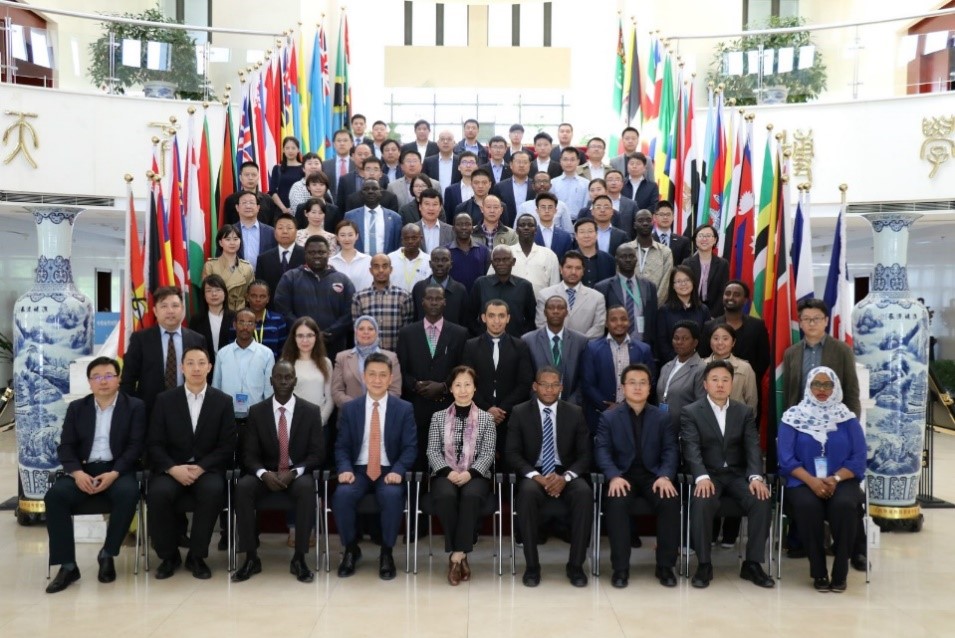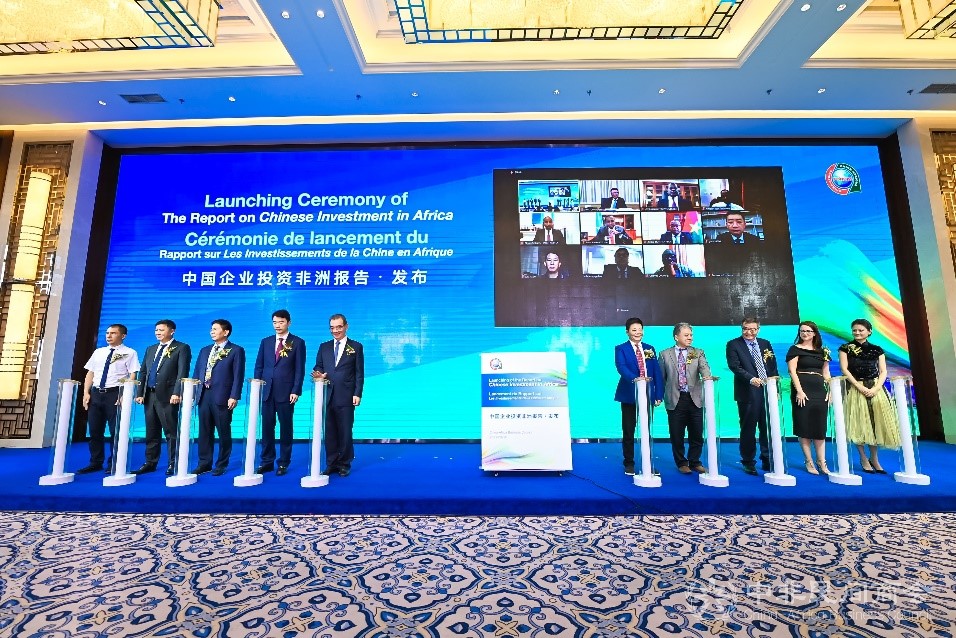 China-Africa Business Council
Converting a United Nations project into a long-standing public-private platform for South-South and triangular cooperation
China-Africa Business Council
Converting a United Nations project into a long-standing public-private platform for South-South and triangular cooperation

Challenges
After China’s Reform and Opening Up process, the country experienced fast growth and development. Throughout this process, China forged a comprehensive strategic relationship with the African continent and today China and Africa have a deep friendship.
In 2004, then Secretary-General of the United Nations, Kofi Annan, visited China and saw first-hand the achievements under the “West China Development Policy.” The Secretary-General proposed the establishment of a China-Africa Business Council, which would focus on facilitating Sino-Africa cooperation, promote private Chinese investment in African countries and facilitate sustainable development through economic collaboration and South-South and triangular cooperation.
Despite being the least developed continent, Africa presents immense economic development prospects. Attracting the right foreign investment into the right sectors, thus, has the potential to boost Africa’s job creation and economic growth.
Towards a Solution
The China-Africa Business Council (CABC) project was jointly established by the United Nations Development Programme (UNDP), China International Center for Economic and Technical Exchanges (CICETE) and the Guangcai Program. The China-Africa Business Council functions as a specialized and internationalized platform to facilitate China-Africa economic and trade cooperation, promote private Chinese investment in Africa and serve as a model for China-Africa South-South cooperation.
After six years (2005-2001) of sponsorship from UNDP and UNOSSC, the council converted itself into a marketing-based chamber of commerce, dedicated to assisting the Chinese private sector seek opportunities in African countries. This public-private partnership under a South-South cooperation framework contributes to many Sustainable Development Goals (SDGs), particularly SDG 8 (decent work and economic growth), SDG 17 (partnership for the goals) and SDG 9 (industry, innovation and infrastructure).
As of February 2022, CABC had over 2,000 business and service company members, covering 54 countries in terms of trading and 45 African countries in terms of investment. In total, member company accumulated investment exceeds US$ 16 billion, created a total of 110,000 local jobs and has generated over 1.6 million direct and indirect local employment places.
CABC has grown from a project to an established non-profit organization (chamber of commerce) for business cooperation which [JS1] [LS2] has facilitated the private sector’s engagement and contribution to South-South and triangular cooperation remarkably. CABC has implemented South-South cooperation projects with 12 institutions from 10 African countries (Ethiopia, Kenya, Liberia, Madagascar, Mauritius, Rwanda, Senegal, South Africa, Tanzania and Zambia). For example, CABC implemented the Promoting the Africa's Broadcast Television Dubbing Skills Project in Tanzania in 2016, the Accessibility of Financial Services and the Private Sector in Africa Project in 2018 and the Proposal for Comprehensive Solutions for City Waste Management in Senegal in 2020.
Cooperation in South-South projects involves research, training programmes and communications in fields such as technology, construction, industrial building, environmental governance, financial services and other public-private partnership projects. CABC harnesses the advanced technologies of Chinese enterprises to boost community economic development in Africa. The fulfilment of Chinese enterprises’ social responsibility is closely integrated with South-South cooperation.
Member company achievements include providing digital TV services to more than 50 million people (10 million households) in 30 African countries and supplying artemisinin medicines to more than 100 million patients in 22 African countries, anti-malaria mosquito nets to 300 million people in nearly 20 African countries and 400 million mobile phones to more than 300 million people across Africa.
CABC was established at a time when much of the cooperation between China and African countries was government-to-government relations. Investment projects at that time were often hand-picked and mostly engaged state-owned enterprises. Thus, the CABC was initiated to create a more sustainable path for investment, facilitating more private companies to invest in Africa, led by real market interest. The fact that CABC went on to become a self-funded membership-based chamber and has continued to grow steadily and attract the 2,000 companies taking part today is evidence that this model is not only successful, but also extremely sustainable in the long run.
Going forward, CABC plans to stay true to its original principles of China-Africa cooperation and is dedicated to helping African countries achieve the SDGs and to supporting a business community that is based on a shared future for mankind.
Contact Information
Countries involved
Supported by
Implementing Entities
Project Status
Project Period
URL of the practice
Primary SDG
Primary SDG Targets
Secondary SDGs
Secondary SDG Targets
Similar Solutions
| NAME OF SOLUTION | Countries | SDG | Project Status | |
|---|---|---|---|---|
A Billion Brains: Smarter Children, Healthier Economies High Level Meeting on South-South Cooperation for Child Rights |
Algeria, Angola, Benin, Botswana, Burkina Faso, Burundi, Cabo Verde, Cameroon, Central African Republic, Chad, China, Comoros, Congo, Côte D'Ivoire, Democratic Republic of the Congo, Djibouti, Egypt, Equatorial Guinea, Eritrea, Eswatini, Ethiopia, Gabon, Gambia (Republic of The), Ghana, Guinea, Guinea Bissau, Kenya, Lesotho, Liberia, Libya, Madagascar, Malawi, Mali, Mauritania, Mauritius, Morocco, Mozambique, Namibia, Niger, Nigeria, Rwanda, Sao Tome and Principe, Senegal, Seychelles, Sierra Leone, Somalia, South Africa, South Sudan, Sudan, Togo, Tunisia, Uganda, United Republic of Tanzania, Zambia, Zimbabwe | 17 - Partnerships for the Goals | Completed | View Details |
Accelerating the Implementation of African Union Treaties in São Tomé and Príncipe South-South learning from the Beninese judicial system’s experience in the application of human rights treaties to its national law |
Algeria, Angola, Benin, Botswana, Burkina Faso, Burundi, Cabo Verde, Cameroon, Central African Republic, Chad, China, Comoros, Congo, Côte D'Ivoire, Democratic Republic of the Congo, Djibouti, Egypt, Equatorial Guinea, Eritrea, Eswatini, Ethiopia, Gabon, Gambia (Republic of The), Ghana, Guinea, Guinea Bissau, Kenya, Lesotho, Liberia, Libya, Madagascar, Malawi, Mali, Mauritania, Mauritius, Morocco, Mozambique, Namibia, Niger, Nigeria, Rwanda, Sao Tome and Principe, Senegal, Seychelles, Sierra Leone, Somalia, South Africa, South Sudan, Sudan, Togo, Tunisia, Uganda, United Republic of Tanzania, Zambia, Zimbabwe | 05 - Gender Equality | Completed | View Details |
Accelerating the Transformational Shift to a Low-Carbon Economy in Mauritius Towards supplying 35 percent of the country’s energy needs with renewables by 2025 |
Algeria, Angola, Benin, Botswana, Burkina Faso, Burundi, Cabo Verde, Cameroon, Central African Republic, Chad, China, Comoros, Congo, Côte D'Ivoire, Democratic Republic of the Congo, Djibouti, Egypt, Equatorial Guinea, Eritrea, Eswatini, Ethiopia, Gabon, Gambia (Republic of The), Ghana, Guinea, Guinea Bissau, Kenya, Lesotho, Liberia, Libya, Madagascar, Malawi, Mali, Mauritania, Mauritius, Morocco, Mozambique, Namibia, Niger, Nigeria, Rwanda, Sao Tome and Principe, Senegal, Seychelles, Sierra Leone, Somalia, South Africa, South Sudan, Sudan, Togo, Tunisia, Uganda, United Republic of Tanzania, Zambia, Zimbabwe | 05 - Gender Equality 09 - Industry, Innovation and Infrastructure 13 - Climate Action | Ongoing | View Details |
Accelerator Labs Network Following collective intelligence methods to address emerging sustainability challenges and the growing demand for local solutions |
Algeria, Angola, Benin, Botswana, Burkina Faso, Burundi, Cabo Verde, Cameroon, Central African Republic, Chad, China, Comoros, Congo, Côte D'Ivoire, Democratic Republic of the Congo, Djibouti, Egypt, Equatorial Guinea, Eritrea, Eswatini, Ethiopia, Gabon, Gambia (Republic of The), Ghana, Guinea, Guinea Bissau, Kenya, Lesotho, Liberia, Libya, Madagascar, Malawi, Mali, Mauritania, Mauritius, Morocco, Mozambique, Namibia, Niger, Nigeria, Rwanda, Sao Tome and Principe, Senegal, Seychelles, Sierra Leone, Somalia, South Africa, South Sudan, Sudan, Togo, Tunisia, Uganda, United Republic of Tanzania, Zambia, Zimbabwe | 08 - Decent Work and Economic Growth 13 - Climate Action | Ongoing | View Details |
Accessibility of Financial Services and the Private Sector in Africa Maximizing the impact of financial cooperation on economic development and industrialization in Africa |
Algeria, Angola, Benin, Botswana, Burkina Faso, Burundi, Cabo Verde, Cameroon, Central African Republic, Chad, China, Comoros, Congo, Côte D'Ivoire, Democratic Republic of the Congo, Djibouti, Egypt, Equatorial Guinea, Eritrea, Eswatini, Ethiopia, Gabon, Gambia (Republic of The), Ghana, Guinea, Guinea Bissau, Kenya, Lesotho, Liberia, Libya, Madagascar, Malawi, Mali, Mauritania, Mauritius, Morocco, Mozambique, Namibia, Niger, Nigeria, Rwanda, Sao Tome and Principe, Senegal, Seychelles, Sierra Leone, Somalia, South Africa, South Sudan, Sudan, Togo, Tunisia, Uganda, United Republic of Tanzania, Zambia, Zimbabwe | 08 - Decent Work and Economic Growth | Completed | View Details |


